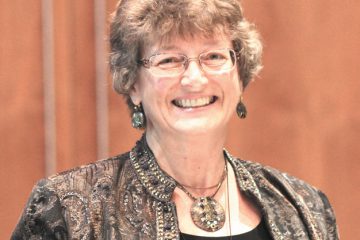Ever after

The Jewish Family Identity Forum With Candace R. Kwiatek, The Dayton Jewish Observer
The hereafter has become a hot topic in recent years. The closing scenes of the blockbuster film Gladiator feature the hero carried off to Elysium where he is reunited with his family.
Television shows including Dead Like Me and Afterlife, NPR’s series What Comes Next? Conversations on the Afterlife, and the radio weekly Spirit Connections highlight the fascination with the transcendental.
A four-year-old who experienced the afterlife spurred the books-and-movie Heaven is for Real phenomenon.
For billions, the afterlife isn’t fiction. In a widely publicized address, Pope Francis recently warned the mafia that they would go to Hell if they do not repent their “dirty businesses and crimes.”
Christian missionary efforts are directed toward saving nonbelievers’ souls. Muslim terrorists believe jihad is a pathway to Heaven.
Scientific research suggests that across nations, belief in punishment in the afterlife is a predictor of ethical behavior (Azim Shariff, Belief in Hell Lowers Crime).
While modern secularists and intellectuals have often dismissed such sentiments as primitive, a crutch or a sham, there is a growing belief that the reality of some kind of afterlife may not be so farfetched.
One area of research is exemplified by physician Jeffrey Long, who documents his discoveries in Evidence of the Afterlife: The Science of Near-Death Experiences. Quantum physicists and astronomers are also finding scientific support for the reality of other realms beyond the visible and physical. From atoms to quarks to black holes, the trajectory of science continues to discover worlds beyond our immediate and physical experience.
Unlike most religious traditions, both ancient and modern, Judaism rarely addresses the hereafter. In fact, it focuses so heavily on this world that many erroneously believe Jewish theology does not include a concept of the afterlife.
Others conclude that, since Christians have Heaven and Hell, Jews don’t. Quite the contrary: the belief in an afterlife has always been part of Jewish thought.
The Bible implies a familiarity with some form of survival after death. Abraham, Jacob, and Aaron are each described as being “gathered to his people.” The biblical Sheol, mentioned as early as Genesis and throughout Prophets and Writings, is a nebulous place where the dead are gathered.
The prophet Elijah is variously described as recording the deeds of each human, directing souls to their proper places in the afterlife, and even traveling between heaven and earth to reward the righteous, connecting reward and punishment with the hereafter.
Even resurrection is an early concept: “And many of them that sleep in the dust of the earth shall awake, some to everlasting life, and some to reproaches and everlasting abhorrence (Daniel 12:2).”
During the Talmudic era, the eternal nature of the soul and resurrection of the body in the messianic era become part of basic Jewish beliefs, although the details are heavily debated in the literature.
As Greek philosophy influences medieval rabbinic thought, immortality of the intellect is added to the mix. Enter Kabalah, Jewish mystical beliefs arising in the 12th century, in which the reincarnation of the soul is discussed extensively by Nachmanides and the Zohar.
Various texts through the ages refer to Gan Eden and Pardes, a garden-like heaven or paradise; Olam haBa, a spiritual afterlife or messianic age of a perfected World-to-Come; and Geihinom and Tophet, a tormented pit of destruction named after the Jerusalem ravine of Canaanite fiery child sacrifices.
With its emphasis on the present world, why has the afterlife been part of Jewish theology?
According to Rabbi Joseph Telushkin in Jewish Literacy, “In Judaism the belief in afterlife is less a leap of faith than a logical outgrowth of other Jewish beliefs. If one believes in a God who is all-powerful and all-just, one cannot believe that this world, in which evil far too often triumphs, is the only arena in which human life exists. For if this existence is the final word, and God permits evil to win, then it cannot be that God is good.”
So what does the afterlife have to do with menschlichkeit? Stories often offer the best answers.
The great Talmudic Rabbi Rava once taught that a person will be judged in the afterlife according to the following criteria: Did you conduct your affairs with integrity? Set aside fixed times for study? Dedicate yourself to family? Live with hope? Seek wisdom and use it for good purposes?
Rabbi Judah haNasi told the following parable about the relationship between body and soul: A king cleverly hired two men, one lame and one blind, to guard his orchard. However, the blind one shouldered the lame one so he could pick the fruit. When brought to trial, each protested that he was unable to do the crime because of his limitations, but the king put the lame man on the shoulders of the blind man and condemned them as one.
Why Jewish tradition and literature are not preoccupied with the afterlife may simply be a result of history, a desire to reject the death-oriented focus of Egypt reflected in its pyramids and Book of the Dead.
Or it may reflect the philosophy that the next life is dependent upon what we do in this one.
While Jewish theology addresses life after death, there is little dogma, leaving the mystery of the afterlife in the hands of the individual. What is clear, however, is that menschlichkeit is consequential today and ever after, and a good policy for both the believer and the skeptic.
Family Discussion: In the feature film Gladiator, the Roman general Maximus exhorts his troops, “What we do in life echoes in eternity.” How does his statement capture the essence of Jewish views about the afterlife?
Literature to share
The Death of Death: Resurrection and Immortality in Jewish Thought by Neil Gillman. An award winner in secular and Jewish literary circles, The Death of Death traces the development of Jewish views about the afterlife, the soul and bodily resurrection. Gillman skillfully weaves the influences of biblical text, Pharisaic tradition, Greek philosophy, Zoroastrianism, Maimonides, and mysticism into the story of the ongoing transformation of Jewish thoughts about what happens after death. Fascinating and well presented.
Deadly by Julie Chibbaro. Packaged as a science thriller, Deadly is historical fiction for the young teen at its best. Leaving finishing school to work in a laboratory, the protagonist joins the investigation of a deadly fever that results in the discovery of Typhoid Mary. Told through journal entries, the story is fast-paced, realistic, and totally engaging.
To read the complete July 2014 Dayton Jewish Observer, click here.



